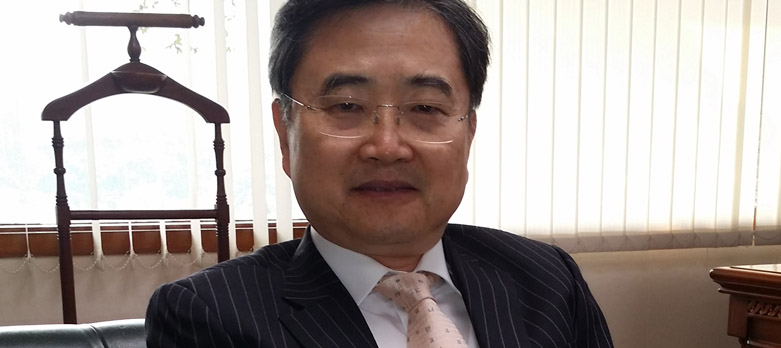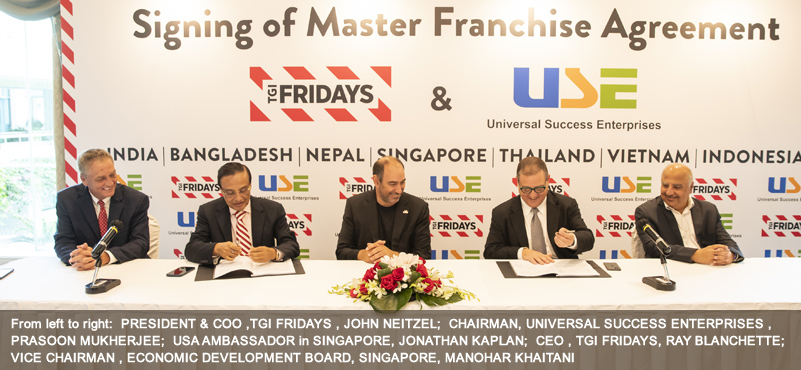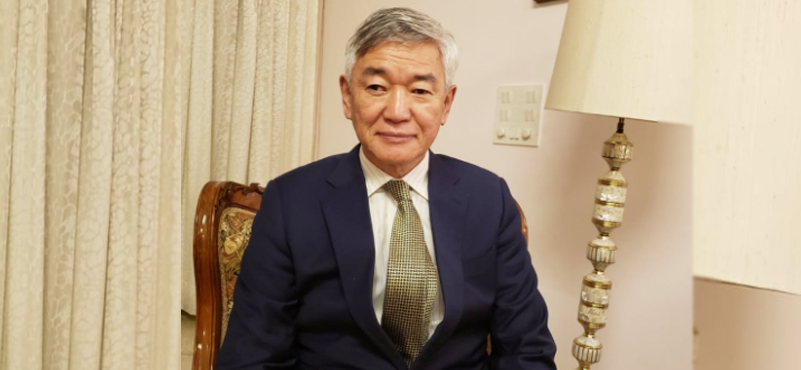In an exclusive with TF, Korean envoy Cho Hyun shared that with a palpable sense of urgency in the government for executing big-ticket projects, Korea saw a great opportunity to engage in areas of its expertise for mutual benefits. He further hoped that India will look into better preservation of Buddhist heritage to fully realize the unexplored potential of religious tourism.
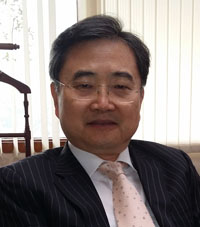
Korean ambassador to India
Calling cinema tourism an opportunity to better understand each-others culture and values, he wished that filmmakers from both the countries could enhance mutual co-operation. “Filmmakers from one nation can travel to the other and make a film there, and other way around. Or, they can remake well known films in either country,” he noted. He suggested that Korean companies could sponsor and support these endeavors. “Companies like LG and Samsung can sponsor Indian filmmakers to visit Korea and shoot an entire movie there. I have urged them to do so,” informed Ambassador Cho Hyun. Divulging that he had also invited businessmen running theatres and movie festivals to join in, he said “I have proposed hosting movie festivals in both countries, so that we get to know each other better. We have to appreciate each other.”
Hoping to host more tourists from India on the Korean Peninsula, he also batted for having more Koreans to come to India and look around this great country. “National carrier is already coming to Mumbai and, after the recent MoU on enhanced connectivity, will come to Delhi shortly,” said the envoy, referring to the recently signed MoU between two countries on tripling the number of flights every week. “Further details pertaining to it will only be announced sometime in the next year; I cannot say anything for sure as of now, because the announcement will be made by the government in Seoul after due consultations with airline companies. I am sure, though, that our national air carrier – Korean Airlines – will come to Delhi,” announced the Ambassador.
 Noting that it was because of historical linkages and presence of a robust Indian community that countries like Malaysia and Singapore held the fort in attracting Indian outbound, especially in the Asian continent, he said “naturally, they benefit with higher Indian outbound. But, we are slowly but surely increasing our visibility and reach into the Indian market,” he explained. “Essentially, Korea is a high-end destination and mostly wealthy Indians looking for some sort of experience are going there, as of now,” he added.
Noting that it was because of historical linkages and presence of a robust Indian community that countries like Malaysia and Singapore held the fort in attracting Indian outbound, especially in the Asian continent, he said “naturally, they benefit with higher Indian outbound. But, we are slowly but surely increasing our visibility and reach into the Indian market,” he explained. “Essentially, Korea is a high-end destination and mostly wealthy Indians looking for some sort of experience are going there, as of now,” he added.
Calling India is an enormous entity, he said that “I will not dare to define it. But, I can tell you that this is the place where human stories are told; human problems are created, too,” said the envoy. “All the aspects of human interface are so visible and prominent here. I am very happy to be here because every day I am exploring the contemporary India, besides understanding its past; different cultures and diverse religions,” he further added.
Improve facilities, conserve heritage to bolster Buddhist tourism; Korean language needs to be given importance for student exchange to grow
 Besides a long history cemented by matrimonial alliance, bilateral ties between the two are also connected through the umbilical cord of Buddhism. India is the cradle of Buddhism and Korea has a substantial Buddhist population. However, envoy Cho Hyun blames inadequate efforts on India’s part in its failure to emerge as a strong peg of bilateral tourism. “We have been doing our bit as a nation. We have many pilgrims coming into India; a number of Korean pilgrims visit Buddhist sites, here, in large groups,” he said. “They tour variety of sites scattered across India. But, there are very few Buddhists remaining here. That is why, may be, it is difficult to create reciprocatory bilateral footfalls, especially in the area of Buddhist tourism,” noted the diplomat.
Besides a long history cemented by matrimonial alliance, bilateral ties between the two are also connected through the umbilical cord of Buddhism. India is the cradle of Buddhism and Korea has a substantial Buddhist population. However, envoy Cho Hyun blames inadequate efforts on India’s part in its failure to emerge as a strong peg of bilateral tourism. “We have been doing our bit as a nation. We have many pilgrims coming into India; a number of Korean pilgrims visit Buddhist sites, here, in large groups,” he said. “They tour variety of sites scattered across India. But, there are very few Buddhists remaining here. That is why, may be, it is difficult to create reciprocatory bilateral footfalls, especially in the area of Buddhist tourism,” noted the diplomat.
He advised India to try harder and take better care of Buddhist heritage and pilgrims. “India may think about enhancing the level of services to pilgrims; better connectivity, enhanced sense of security, and at least an assurance that they are being cared by some responsible Indian authority will go a long way in addressing these lacunae,” he noted.
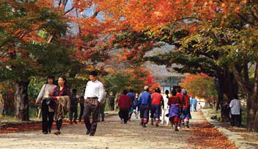 When asked whether enhanced student exchange could help creating better awareness and improved mutual tourism, and whether language remained a barrier in achieving it, he dispelled the argument by divulging that language was not a barrier and university level students, in Korea, were well-versed in English. “Increasing numbers of Indian students are speaking Korean, too. Back in Korea, there are many universities that have Indian studies as a part of their curriculum along with Hindi language,” he explained. He, however, did concede that it was not enough. “We can, of course, increase footfalls. What I think is important that Indian government adopts Korean language as a foreign language, or at least bestows some degree of official importance to it,” he suggested a way forward. “That is our dream; and our text-books should cover more aspects of each other’s culture and history. I, personally, have been encouraging inclusion of Indian history in Korean text-books to cover more salient aspects, and we would want the same happening in India,” he added. Sharing that he had been getting good response so far, he noted that the problem lied in outright migration of those who gained proficiency in Korean language to their shores to work for Korean companies. “Instead, if they become teachers, we would have a number of youngsters better aware of Korea and its offerings,” said the envoy.
When asked whether enhanced student exchange could help creating better awareness and improved mutual tourism, and whether language remained a barrier in achieving it, he dispelled the argument by divulging that language was not a barrier and university level students, in Korea, were well-versed in English. “Increasing numbers of Indian students are speaking Korean, too. Back in Korea, there are many universities that have Indian studies as a part of their curriculum along with Hindi language,” he explained. He, however, did concede that it was not enough. “We can, of course, increase footfalls. What I think is important that Indian government adopts Korean language as a foreign language, or at least bestows some degree of official importance to it,” he suggested a way forward. “That is our dream; and our text-books should cover more aspects of each other’s culture and history. I, personally, have been encouraging inclusion of Indian history in Korean text-books to cover more salient aspects, and we would want the same happening in India,” he added. Sharing that he had been getting good response so far, he noted that the problem lied in outright migration of those who gained proficiency in Korean language to their shores to work for Korean companies. “Instead, if they become teachers, we would have a number of youngsters better aware of Korea and its offerings,” said the envoy.
Government initiatives provide an opportunity for stronger ties and improved bilateral footfalls
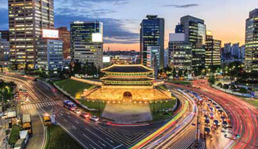 “We are very happy to see new initiatives undertaken by the new government headed by PM Modi, and to be partners in India’s quest for better quality of life for its citizens, said Excellency. Explaining that Korea had ably succeeded in transforming itself into a beacon of prosperity and it was those experiences that it could share with India in its mammoth undertakings, he said “we have a certain degree of experience in these areas; Korea was a poor country and an agrarian society. But, it took us only three decades to become a mature economy and a developed country; we are a part of OCED nations.” Adding that it was possible not because they were smarter than the rest, but because Korea was a smaller nation with a homogenous society, he said “I do not brag about it. But our case can be studied by Indians.”
“We are very happy to see new initiatives undertaken by the new government headed by PM Modi, and to be partners in India’s quest for better quality of life for its citizens, said Excellency. Explaining that Korea had ably succeeded in transforming itself into a beacon of prosperity and it was those experiences that it could share with India in its mammoth undertakings, he said “we have a certain degree of experience in these areas; Korea was a poor country and an agrarian society. But, it took us only three decades to become a mature economy and a developed country; we are a part of OCED nations.” Adding that it was possible not because they were smarter than the rest, but because Korea was a smaller nation with a homogenous society, he said “I do not brag about it. But our case can be studied by Indians.”
He believed that with ample experience of such rapid development, Koreans could come to Indian shores and reap mutual benefits through business engagements. “That’s why I believe in the coming days, more and more Korean companies will come to India and this exchange of ideas and concurrence of action will steadily boost footfalls,” noted the senior diplomat. Pointing to specific areas of engagement, he referred to waste management being a huge issue. “Korean companies are world-renowned in that aspect; treatment of odour and toxic waste is another aspect that we are very good at. So, these mega initiatives open a big window of opportunity for Korea,” he explained. Noting that once trade volume will increase, it will automatically lift the bilateral tourist numbers, he sounded more than confident about the shared future of both nations and hoped that intense engagement at various levels will augment tourism in the months ahead.
Further substantiating his argument, he mentioned that “there is a major program slated to be held in February in Mumbai on ‘Make in India’. We are trying to ensure a serious partition from the Korean contingent. We are also hosting a major business summit here in Delhi, soon,” said Excellency.
Talking specifically about sectors, he pointed towards opportunities in large-scale manufacturing. “It is a key area. Hyundai motors can definitely have one more factory here; Samsung can raise its stake here to a much higher level,” said the Ambassador. However, refusing to limit bilateral engagement to the macro levels, he believed that many smaller companies will come to India, too. “It will help India become more effective, beautiful and efficient. We want to see that happen,” noted the envoy.

